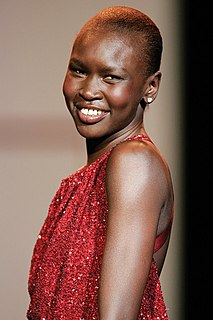A Quote by Alek Wek
Leaving southern Sudan as a child was terrifying. It was 1985, and my family and I were trying to escape to Khartoum, the capital in the North, to safety.
Related Quotes
What's really interesting, though, is that some people in the Messirya are starting to see Darfuri rebels - so non-Arab, [from the] Justice and Equality Movement - have moved over into Southern Kordofan, which is supposed to be a Messirya stronghold, and started recruiting Messirya to go and fight against the Khartoum government in Darfur. Just another example of how everything in Sudan is interlinked.
I would like to get out to the region in the Caspian sea. I would like to go there. I would like to get to Darfur. I would like to get to Khartoum in Northern Sudan. I would like to get to Zimbabwe. I would like to go back to North Korea, if I could. I would like to go to Yemen. I would like to get to Kashmir. Most of those destinations I will get to.
As the eldest son of an Alabama sharecropper family, I was constantly troubled by a collage of North American southern behaviors and notions in reference to the inhumanity of people. There were questions that I did not know how to ask but could, in my young, unsophisticated way, articulate a series of answers.
I try not to cover Sudan from afar. I feel really uncomfortable writing about Sudan when I'm not there. It always looks different. When you're outside Sudan it's easy to lose sight of how much of what happens is driven by local politics. And when you're in America in particular, there's this sense that what D.C. has to say is the only thing that counts. Unsurprisingly people in Sudan don't feel the same way.
I was involved in trying to save the Rwandan people and Sudan now. It's a mass murder. Mass murder is a terrifying word. We don't have to go further than that. Cambodia came close to, but what was it, Cambodians killing Cambodians after all. So therefore I think we should be very careful with vocabulary.
Ford is leaving. You see that, their small car division leaving. Thousands of jobs leaving Michigan, leaving Ohio. They're all leaving. And we can't allow it to happen anymore.As far as child care is concerned and so many other things, I think Hillary Clinton and I agree on that. We probably disagree a little bit as to numbers and amounts and what we're going to do, but perhaps we'll be talking about that later.





































